- Home
- Michael Ondaatje
Anil's Ghost Page 2
Anil's Ghost Read online
Page 2
For the last three years the Oronsay had been berthed permanently in an unused quay at the north end of Colombo harbour. The grand ship had now become essentially part of the land and was being used by Kynsey Road Hospital as a storage and work area. With limited lab space in the hospitals in Colombo, a section of the transformed liner was to be Sarath and Anil’s base.
They left Reclamation Street and walked up the gangplank.
She struck a match, and in the dark hold, light focussed and spilled up her arm. She saw the cotton thread of ‘protection’ on her left wrist, and then the match went out. In the month since the raksha bandhana had been tied on during a friend’s pirith ceremony it had lost its rose colour. When she pulled on a rubber glove in the laboratory, the thread was even paler under it, as if within ice.
Next to her Sarath turned on a torch he had located during the flare of her match, and they both moved forward behind the spoke of twitching light, towards the metal wall. When they reached it he banged hard with the flat of his hand and they heard movement in the room beyond, the scurrying of rats. He banged again, and again there were sounds of movement. She murmured, ‘Like a man and a woman scrambling out of bed when his wife comes home,’ then stopped. Anil didn’t know him well enough to taunt the structure of marriages. She was about to add, Honey, I’m home.
Honey, I’m home, she would say, crouching beside a corpse to ascertain the hour of death. The phrase came out caustic or tender, depending on her mood, mostly in a whisper as she put her hand out and held her palm a millimetre over the flesh to take in its body heat. Its. Not his or hers anymore.
‘Bang it once more,’ she asked him.
‘I’ll use the claw hammer.’ This time the metallic noise echoed into the dark space, and when it died down everything became silent.
‘Close your eyes,’ he said. ‘I’ll light a sulphur lamp.’ But Anil had worked in night quarries alongside sulphur brightness, or in basements made naked by it. The porous light revealed a large room, the remnants of a toppled saloon counter in the corner, behind which she later would find a chandelier. This was to be their storage space and work lab, claustrophobic, the odour of Lysol in the air.
She noticed Sarath had already begun using the space to store some of his archaeological findings. There were rock and bone fragments wrapped in clear plastic all over the floor, crates roped tight. Well, she hadn’t come here to deal with the Middle Ages.
He was saying something she could not hear, while unlocking boxes, bringing out the results of a recent dig.
‘. . . mostly sixth century. We think it was a sacred grave for monks, near Bandarawela.’
‘Were any skeletons found?’
‘So far three of them. And some fossilized wood pots of the same period. Everything fits into the same time pattern.’
She pulled her gloves on and lifted an old bone to test the weight. The dating seemed right.
‘The skeletons were wrapped in leaves, then cloth,’ he told her. ‘Then stones were placed on top of them, which slid down later through the rib cage into the chest area.’
Years after a body was buried there would be a small shift on the surface of the earth. Then a falling of that stone into the space left by decayed flesh, as if signalling the departure of a spirit. This was a ceremony of nature that always affected her. As a child in Kuttapitiya Anil had once stepped on the shallow grave of a recently buried chicken, her weight driving the air in the dead body out through its beak—there was a muffled squawk, and she’d leapt back with fear, her soul jostled, then clawed earth away, terrified she would see the creature blink. But it was dead, sand in its eyes. Anil was still haunted by what had occurred that afternoon. She had buried it once more and walked backwards away from the grave.
Now she picked a fragment of bone from the detritus pile and rubbed it. ‘This is from the same place? It doesn’t seem sixth-century.’
‘All this material comes from the monks’ burial midden, in the government archaeological preserve. Nobody else gets in.’
‘But this bone—it doesn’t come from that time.’
He had stopped what he was doing and was watching her.
‘It’s a government-protected zone. The skeletons were interred in natural hollows near the Bandarawela caves. Skeletons and loose bones. It’s unlikely you’d find anything from another era.’
‘Can we go there?’
‘I suppose so. Let me try and get a permit.’
They climbed back up onto the deck of the ship, into sunlight and noise. They could hear powerboats in the main channel of Colombo harbour, megaphones shouting out over the crowded waterways.
On her first weekend, Anil borrowed a car and drove to a village a mile beyond Rajagiriya. She parked by a lot tucked away behind trees, so small she could not believe a house existed there. Large speckled leaves of crotons spilled into the courtyard. There seemed to be no one at home.
The day after she arrived in Colombo Anil had sent a letter but there had been no reply. So she didn’t know if this would be a wasted trip, whether the silence meant acceptance or the address she had was extinct. She knocked, then looked through the bars of the window, turning around quickly as she heard someone come out onto the porch. Anil could hardly recognize the tiny aged woman. They stood facing each other. Anil stepped forward to embrace her. Just then a young woman walked out and watched them without a smile. Anil was aware of the stern eyes that were taking in this sentimental moment.
When Anil leaned back the old woman was weeping; she put her hands out and ran them over Anil’s hair. Anil held her arms. There was a lost language between them. She kissed Lalitha on both cheeks, having to bend down to her because she was small and frail. When Anil let go, the old woman seemed stranded and the young woman—who was she?—stepped forward and led her to a chair, then left. Anil sat next to Lalitha and held her hand in silence, feeling an ache in herself. There was a large framed photograph on the table beside them, and Lalitha picked it up and passed it to Anil. Lalitha at fifty, and her ne’er-do-well husband, and her daughter, who held two babies in her arms. Her finger pointed to one of the babies and then into the darkness of the house. So the young woman was her granddaughter.
The young woman brought out a tray of sugar biscuits and tea, and for the next while the granddaughter talked in Tamil to Lalitha. Anil could understand only a few words when it was spoken, relying mostly on the manner of speech to understand what they were saying. She’d once said something to a stranger who had met her sentence with a blank stare, and had then been told that because of her lack of tone the listener didn’t understand the remark. He could not tell if it was a question, a statement or a command. Lalitha seemed embarrassed to be talking in Tamil and was whispering. The granddaughter, who barely looked at Anil after the first shaking of hands, was speaking loudly. She looked at Anil and said in English, ‘My grandmother wants me to take a picture of the two of you. To remember that you came here.’
She left once more, then returned with a Nikon and asked them to move closer to each other. She said something in Tamil and took one picture before Anil was quite ready. One seemed to be enough. She was certainly confident.
‘Do you live here?’ Anil asked.
‘No. This is my brother’s house. I work in the refugee camps up north. I try to come down every other weekend, so my brother and his wife can get away. How old were you when you last saw my grandmother?’
‘I was eighteen. I’ve been away since then.’
‘You have parents here?’
‘They’re dead. And my brother left. Just my father’s friends are still here.’
‘Then you don’t have any connection, do you?’
‘Just Lalitha. In a way she was the one who brought me up.’ Anil wanted to say more, to say that Lalitha was the only person who taught her real things as a child.
‘She brought all of us up,’ the granddaughter said.
‘Your brother, what does he—’
‘He’s quit
e a famous pop singer!’
‘And you work in the camps . . .’
‘Four years now.’
When they turned back to her, they saw Lalitha had fallen asleep.
She entered Kynsey Road Hospital and in the main hall found herself surrounded by hammering and yelling. They were breaking up the concrete floors in order to put down new tiles. Students and faculty rushed past her. No one appeared to be concerned that these sounds might be terrifying or exhausting to patients brought in to have wounds dressed or receive stabilizing drugs. Even worse was the voice of the senior medical officer, Dr. Perera, yelling to doctors and assistants, calling them devils for not keeping the building clean. It was so continuous, this yelling, that it seemed to go unheard by most who worked there.
He was a short, thin man, and he had probably only one ally in the building, a young woman pathologist, who, not realizing his reputation, had come to him for help once and thus, by startling him, was befriended. The rest of his colleagues in the building distanced themselves with a tidal wave of anonymous memos and posters. (One poster announced that he was wanted in Glasgow for murder.) Perera’s defense was that the staff was undisciplined, lazy, foolish, unclean and wrongheaded. It was only when he spoke in public that he switched to intellectual and subtle arguments about politics and its link to forensic pathology. His milder twin somehow seemed to have smuggled himself onto the stage.
Anil had heard one of his talks on her second night in Colombo and had been surprised that there were people with his opinions in positions of authority. But now, in the hospital, where she had come to use some equipment, she met the roving snapping dog that was the other side of his nature. She stood there openmouthed while exhausted staff, personnel and workmen and ambling patients veered away from Perera, creating a zone between themselves and this Cerberus.
A young man came up to her.
‘You are Anil Tissera, no?’
‘That’s right.’
‘You won the scholarship to America.’
She didn’t say anything. The foreign celebrity was being pursued.
‘Can you give a small talk, thirty minutes, on poisoning and snakebite?’
They probably knew just as much about snakebite as she did, and she was sure that this choice of subject was intentional—to level the playing field between the foreign-trained and the locally trained.
‘Yes, all right. When?’
‘Tonight?’ the young man said.
She nodded. ‘You contact me at lunch and tell me where.’ She was saying this as she swerved past Dr. Perera.
‘You!’
She turned to face the infamous senior medical officer.
‘You’re the new one, no? Tissera?’
‘Yes, sir. I heard your speech two nights ago. I’m sorry I—’
‘Your father was . . . this thing . . . right?’
‘What . . .’
‘Your father was Nelson K. Tissera?’
‘Yes.’
‘I worked with him at Spittel’s Hospital.’
‘Yes . . .’
‘Look at those padayas. Look—the rubbish here in the halls. This is a hospital, no? Bloody bastards, like a latrine. You are busy now?’
She was busy though she could have changed her plans. She was eager to speak to Dr. Perera and reminisce about her father, but she wanted to do so when he was decaffeinated, calm and alone, not in the midst of a fury. ‘I’ve got a government appointment, I’m afraid, sir. But I’m in Colombo for a while. I hope we can meet.’
‘Your dress is Western, I see.’
‘It’s a habit.’
‘You’re the swimmer, no?’
She walked away, nodding exaggeratedly.
Sarath was reading her postcard upside down as he sat across the desk from her. An unconscious curiosity on his part. He was a man used to cuneiform, faded texts in stone. Even in the shadowed light of the Archaeological Offices this was an easy translation for him.
The sound in the offices was mostly that of the careful pecking of typewriters. Anil had been given the desk by the copy machine, around which there was a permanent tone of complaint, for it never worked properly.
‘Gopal,’ Sarath said, slightly louder than usual, and one of his assistants came to his desk.
‘Two teas. Bullmilk.’
‘Yessir.’
Anil laughed.
‘It’s a Wednesday. Your malaria pill.’
‘Took it.’ She was surprised by Sarath’s concern.
The tea arrived with the condensed milk already in it. Anil picked up her cup and decided to push it.
‘To the comfort of servants. A vainglorious government. Every political opinion supported by its own army.’
‘You talk like a visiting journalist.’
‘I can’t ignore those facts.’
He put his cup down. ‘Look, I don’t join one side or the other. If that’s what you mean. As you said, everyone has an army.’
She picked up the postcard and spun it between her thumbs. ‘Sorry. I feel tired. I’ve spent all morning going through reports at the Civil Rights Movement office. There’s nothing hopeful there. Do you want to have dinner later?’
‘I cannot.’
She waited for some explanation but nothing more came from him. Just his eyes darting to a map on the wall, to the picture of the bird on her postcard. While he continued to tap his pencil against the desk.
‘Where’s that bird from?’
‘Oh . . . nowhere.’ She could close down too.
An hour later they were running through rain and were fully wet by the time they climbed into the car. He drove her to Ward Place and kept the car idling under the portico as she collected her things from the back seat. ‘See you tomorrow,’ she said, and closed the door.
Once inside, Anil emptied her bag onto the table to find the postcard. Rereading her girlfriend Leaf’s message from America made her feel better. Some communication from the West. She went into the kitchen, her mind circling around Sarath once more. She had been working with him for several days and she still had no handle on him. He was high up in the state-sponsored Archaeological Department, so how much a part of the government was he? Was he its ear and eye while assigned to aid her in the Human Rights investigation and report? In that case whom was she working for?
Forensic work during a political crisis was notorious, she knew, for its three-dimensional chess moves and back-room deals and muted statements for the ‘good of the nation.’ In the Congo, one Human Rights group had gone too far and their collection of data had disappeared overnight, their paperwork burned. As if a city from the past had been reburied. The investigative team, which included Anil in a lowly role as a programme assistant, had nothing left to do but get on a plane and go home. So much for the international authority of Geneva. The grand logos on letterheads and European office doors meant nothing where there was crisis. If and when you were asked by a government to leave, you left. You took nothing with you. Not a slide tray, not a piece of film. At the airport, while they searched her clothing, she’d sat almost naked on a stool.
One postcard from Leaf. One American bird. She pulled some cutlets and a beer out of the fridge. There would be a book to read, a shower to take. Later she might go to Galle Face Green and have a drink at one of the newer hotels, watch the drunk members of a touring English cricket team sing karaoke.
Was the partner assigned to her neutral in this war? Was he just an archaeologist who loved his work? The day before, on a road trip out of Colombo, he had shown her a few temples and then, passing some of his students working in a historic area, had joyfully joined them and was soon collecting slivers of mica, telling them where they were likely to find fragments of iron in the ground, as if he were a gifted and natural finder of things. Most of what Sarath wished to know was in some way linked to the earth. She suspected he found the social world around him irrelevant. His desire, he had told her, was to write a book someday about a city in the south of the isla
nd that no longer existed. Not a wall of it remained, but he wanted to tell the story of that place. It would emerge out of this dark trade with the earth, his knowledge of the region in chronicles—its medieval business routes, its presence as a favourite monsoon town of a certain king, as revealed in poems that celebrated the city’s daily life. He’d quoted a few lines from one of the poems which his teacher, a man named Palipana, had taught him.
That was Sarath at his most expressive, almost enthusiastic, one evening after a crab dinner in Mount Lavinia. He stood by the surf drawing the shape of the city with his hands, sketching it in the dark air. Through the imaginary lines she could see the waves, their curl and roll, like his sudden excitement moving towards her.
There were police officers all over the train. The man got on carrying a bird cage with a mynah in it. He walked through carriages, glancing at other passengers. There were no seats left and he sat on the floor. He was wearing a sarong, sandals, a Galle Road T-shirt. It was a slow train, travelling through rock passes, then emerging into sudden vistas. He knew that a mile or so before they got to Kurunegala there would be a tunnel and the train would curve into the dark claustrophobia of it. A few windows would remain open—they needed fresh air, though it meant the noise would be terrible. Once past the tunnel, back into sunlight, they would be getting ready to disembark.
He stood just as the train went into darkness. For a few moments there was the faint muddy light of the bulbs and then they went out. He could hear the bird talking. Three minutes of darkness.

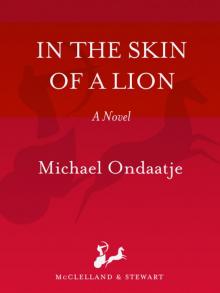 In the Skin of a Lion
In the Skin of a Lion The Cinnamon Peeler
The Cinnamon Peeler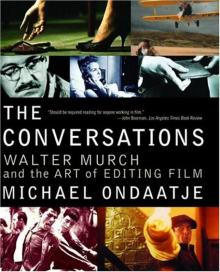 The Conversations: Walter Murch and the Art of Editing Film
The Conversations: Walter Murch and the Art of Editing Film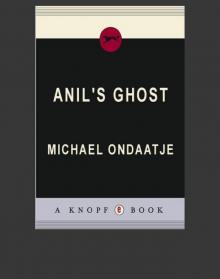 Anil's Ghost
Anil's Ghost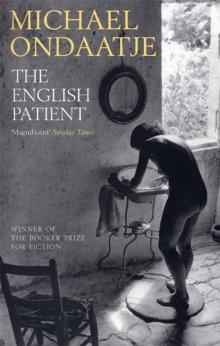 The English Patient
The English Patient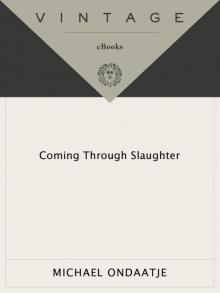 Coming Through Slaughter
Coming Through Slaughter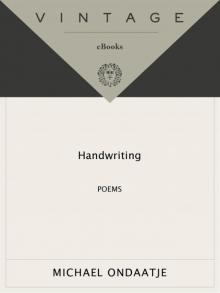 Handwriting
Handwriting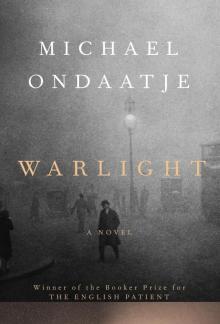 Warlight
Warlight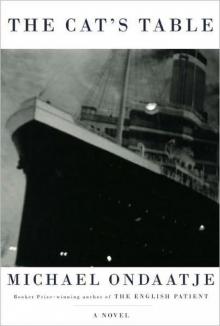 The Cat's Table
The Cat's Table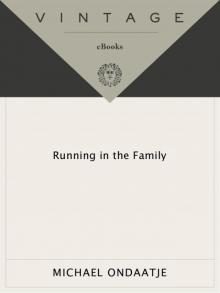 Running in the Family
Running in the Family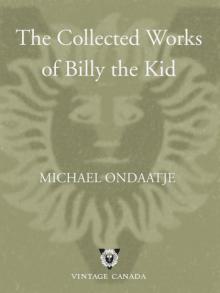 The Collected Works of Billy the Kid
The Collected Works of Billy the Kid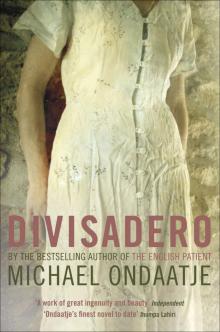 Divisadero
Divisadero